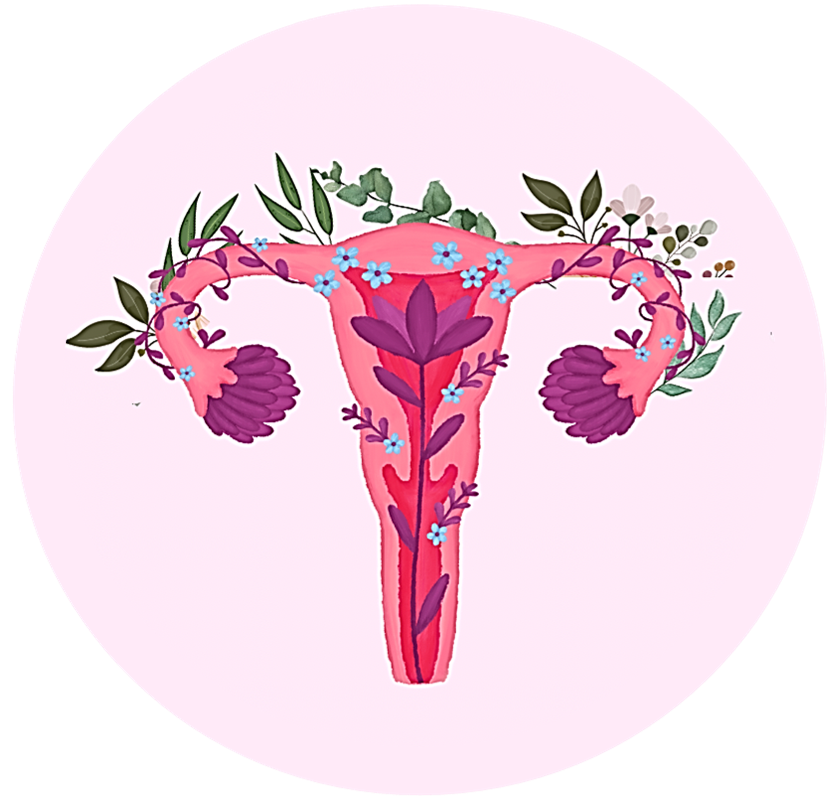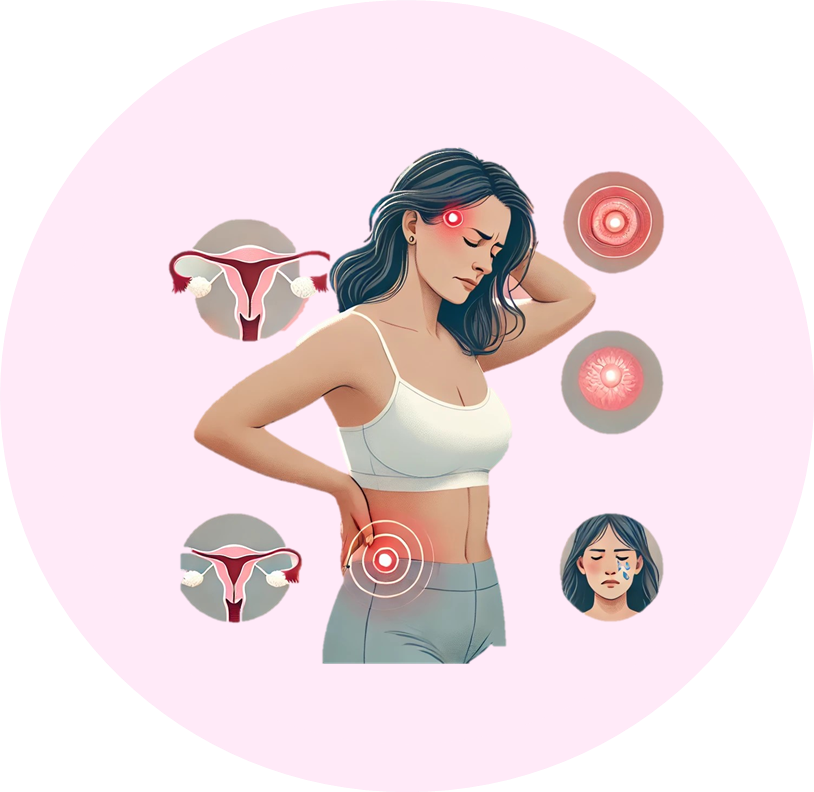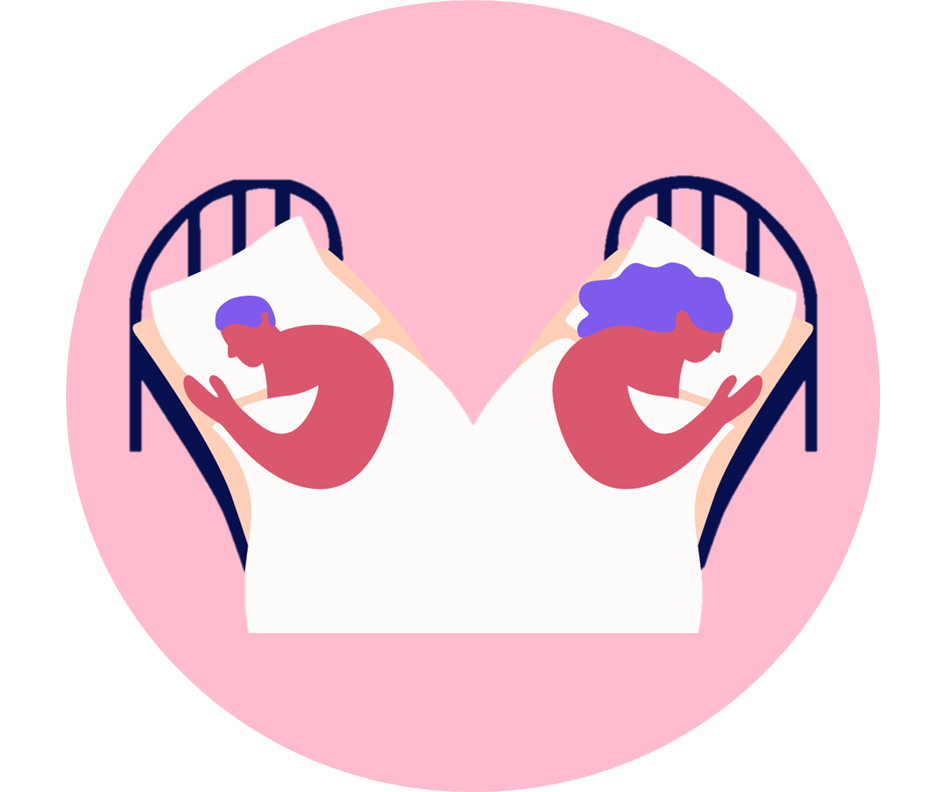Is It Just Me, or Is This Perimenopause?

Perimenopause Diagnosis
Perimenopause is typically diagnosed when a woman experiences symptoms, yet her menstruation has not stopped, and no other health conditions are present. This diagnosis relies on her symptoms and age. However, it can be challenging, as there are no reliable hormone tests due to fluctuating levels during this time. Raising awareness of the common symptoms of perimenopause is crucial, as many women may not fully understand the natural changes occurring during this transitional phase and the symptoms triggered by hormonal shifts.
Common Perimenopause Symptoms
Perimenopause symptoms can vary greatly from woman to woman, often significantly impacting daily life. They can affect every aspect of your life, including social interactions, family dynamics, relationships, and work. Typically, more than one symptom is present once you are established in this phase. It is likely you will experience several of them. The challenge lies in connecting the dots between these symptoms to realise they do not exist in isolation. Feeling tired, flat, or struggling with weight gain might seem like separate issues. However, they are often interconnected and tied to the hormonal shifts of perimenopause. Let’s take a look at some of the most common symptoms of perimenopause.

Changes in Menstrual Cycle
One of the key symptoms of perimenopause is a change in your menstrual cycle. This can include irregular periods, heavier or lighter bleeding, or changes in cycle length. However, it is important to note that you might start experiencing other perimenopausal symptoms before any noticeable changes in your menstrual cycle occur.
This timing can make it more challenging to recognise that perimenopause is underway. In addition, many women are using some form of hormonal contraception, such as birth control pills, IUDs (intrauterine devices or coil), or implants, which can alter or even stop menstrual bleeding altogether. Because hormonal contraceptives can mask or mimic symptoms, the typical menstrual changes that signal perimenopause might go unnoticed. As a result, you might experience other symptoms without the telltale sign of an irregular period, making it even more difficult to recognise the onset of perimenopause.

Aches and Pains
During perimenopause, many women experience a range of pains and aches, some of which can be really unbearable. These pains can come on suddenly and disappear just as quickly. The most common types are muscle and joint pains, as hormonal changes can lead to inflammation and stiffness in the joints. This can be especially challenging, as the risk of osteoporosis and osteoarthritis increases during perimenopause and beyond. Breast soreness is another common symptom, often caused by fluctuating hormone levels, which can make breasts feel tender, swollen, or even painful to touch. In addition to joint discomfort, many women also experience body-wide aches and fatigue, which can leave them feeling drained. Another frequent issue is headaches, often referred to as hormone headaches, which are particularly common in women who previously suffered from headaches linked to their menstrual cycle. For some, these headaches can become so intense that they become nearly unbearable. Abdominal cramps, similar to those experienced during ovulation, are also common during this time, adding to the overall discomfort many women face.

Changes to Mood and Emotions
Perimenopause can bring about significant changes in mood and emotions due to fluctuating hormone levels, particularly oestrogen and progesterone. Many women report feeling more irritable, anxious, or even depressed during this transitional phase. These emotional changes can vary from person to person and may include mood swings, increased irritability, feelings of sadness, or a sense of overwhelm. For some, it might feel like you are on an emotional rollercoaster, crying for no apparent reason or experiencing unexpected bursts of happiness. In my case, it is more often the crying part; I am still waiting for that euphoric, carefree feeling to take over! It is important to recognise that these emotional shifts are a normal part of perimenopause and are often linked to hormonal changes that affect brain chemistry. Additionally, the challenges of managing other perimenopausal symptoms, such as sleep disturbances or physical discomfort, can exacerbate feelings of stress and emotional instability.

Tiredness and Sleep Problems
Sleep disturbances can often be the tipping point that prompts women to realise their hormones are changing. Disrupted sleep or insomnia can begin in early perimenopause, driven by declining progesterone levels, which play a key role in promoting relaxation and restful sleep. There are numerous factors that can contribute to poor sleep quality, including hot flashes, feeling cold, or the need for more frequent urination. Mental and emotional stress linked to perimenopause can further disrupt sleep patterns, creating a frustrating cycle. The lack of a good night’s sleep exacerbates other symptoms, leading to increased fatigue and a sense of being overwhelmed. This vicious cycle can be incredibly hard to break, leaving women both mentally and physically drained. Recognising and addressing these sleep challenges is crucial for managing overall well-being during perimenopause.

Physical Changes
During perimenopause, many women notice physical changes, including increased weight, brittle nails, dry and thinning hair, and dry, itchy skin. These changes are often linked to declining estrogen levels, which play a vital role in stimulating the production of collagen, elastin, and hyaluronic acid—key components for maintaining healthy skin, hair, and nails. Weight gain during this stage is commonly associated with a slower metabolism and changes in insulin sensitivity, which contribute to increased fat storage.
Perimenopause can also affect gut health, slowing digestion and leading to uncomfortable symptoms such as bloating, excess gas, constipation, irregular bowel movements, and even nausea. Hormonal fluctuations can further impact appetite regulation, causing cravings or changes in eating habits. As digestion slows and the body becomes less efficient at processing food, fat storage—particularly around the abdominal area—can increase. Additionally, many women may become less active, often due to disrupted sleep and chronic fatigue, which can contribute further to weight gain. Other common perimenopause symptoms, such as mental and emotional stress, can also reduce motivation, making it even more difficult to manage these changes and navigate this challenging phase.

Vaginal Health and Sex
Changes in hormone levels during perimenopause can often lead to a loss of libido and other urinary symptoms, collectively known as genitourinary syndrome of menopause. This term encompasses a variety of vaginal, urinary, and pelvic floor issues caused by hormonal shifts. The decline in oestrogen levels affects the vaginal pH, making it less acidic (more alkaline). Normally, the acidic pH of the vagina helps protect against harmful bacteria, but during perimenopause, women become more susceptible to infections like thrush and cystitis. Oestrogen loss also causes thinning of the vaginal walls (vaginal atrophy), making the vaginal lining drier, less flexible, and more fragile. This can further increase the risk of discomfort, irritation, and infections. In addition, natural lubrication decreases, leading to discomfort during sex and potentially a loss of libido. The pelvic floor muscles may also lose their tone, contributing to urinary incontinence and pelvic prolapse, which can complicate the physical changes women experience during this stage.

Brain Fog
Perimenopause can also impact cognitive abilities, such as focus, concentration, and memory. During this time, you might find yourself feeling confused, forgetful, or unable to concentrate. These symptoms can be rather debilitating. In the UK, one in ten women, aged between 40 and 55, working through menopause, leaving their jobs because of their symptoms. A further 13% reported that they had considered leaving. Many women face this challenging decision due to a lack of support in the workplace. Oestrogen and testosterone play key roles in cognitive function, so as their levels fluctuate, staying focused or retaining new information can become more difficult. These cognitive difficulties can be further exacerbated by poor sleep, anxiety, or other emotional stressors, making it even harder to navigate daily tasks.
Perimenopause is a highly individual experience. While I have highlighted some of the most common symptoms here, they certainly do not represent the full spectrum of what women may face. Every woman’s journey is unique, and there is no one-size-fits-all approach to this phase of life. What is important is that you understand that your experiences are valid and real. Tracking your symptoms and seeking support from healthcare professionals can help you manage this phase more effectively, reduce symptom burden, and address any potential underlying health concerns. Most importantly, remember that you are not alone in this. Sharing your story and connecting with others can provide comfort, understanding, and solidarity as you navigate this challenging but transformative time.
Have a look at the previous post on Perimenopause in a Demanding World.

M
This is very insightful and helpful. I’ve been feeling tired and achy, and forgetful for ages and recently noticed my skin becoming dry and itchy. It must be perimenopause! I can also relate to the very important and sad fact you highlighted above, how women’s work/career can be affected as I recently decided to pause my (fast progressing and successful until now) career as I feel I’m not good enough anymore/can’t cope with the pressure. It’s so sad and underrecognised, even by women themselves ☹️ We need to talk openly about it more!